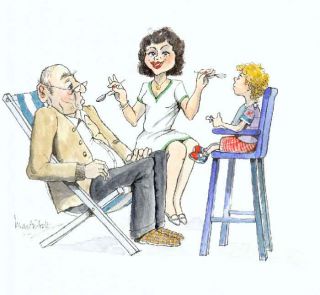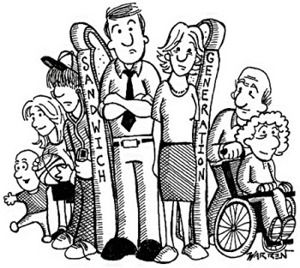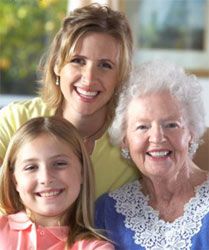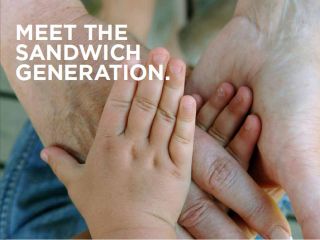Parenting
The Sandwich Generation... On Steroids
Why caring for children and elderly parents is getting worse by the year.
Posted October 9, 2012

Sadly, many mid-life couples feel the intense squeeze and pressure of caring for their children and elderly parents at the same time. For example, while at a coffee shop this past weekend I bumped into a very tied looking middle aged colleague named Jeff. I asked him how he was doing while he ordered a very large cup of coffee. He mentioned that he was exhausted and stressed out. His oldest child just started college (out of state) and he recently returned home from getting her settled in. His second child just started high school and finds that the transition from a small private middle school to a very large diverse public high school hard. His mother-in-law recently died after a long illness and now he and his wife were about to catch a plane to assist with moving his father-in-law into an assisted living facility. Additionally, since his father-in-law has dementia, there are fiancial, housing, and other matters that need to be managed as well. Jeff was pooped! The so-called "Sandwich Generation" (caring for both young children and elderly parents) is nothing new but these challenges are getting much more difficult in recent years. Here’s a few reasons why...

1. People are living longer and having higher expectations about quality of life during their elder years. While it is great that life expectancy has increased dramatically during the past century one of the unintended consequences is that care for increasingly elderly parents has become a major problem for most middle aged couples. Additionally, in our American culture, it is rare to have elderly parents living under the same roof as their children and grandchildren and so they often need typically high priced assisted living, nursing, and medical care for a very long time. Compounding this issue is the fact that so often elderly parents don’t live in the same community or even the same region of the country as their offspring adding expenses and practical challenges of caring for them.

2. Children need parental care for much longer periods of time than in the past. Much has been written about how adolescence has now been extended such that it has become much more difficult for young adults to become independent from their parents in a timely way relative to previous generations. In the past, once young adults completed high school or college, they would get jobs, find a mate, and become independent adults. Now, so many young adults well into their 20’s and even 30’s are still highly dependent upon their parents. Many college graduates move back in with their parents after their education is completed for example. A sluggish economy as well as the increasing need for additional education beyond college make these matters worse for parents.

3. Families are more complex than in the past often meaning middle aged couples have more people to care for. One of the unintended consequences of a divorce rate that hovers around 45% of all first marriages is that there are many more people to take care of. Think about it. If you have been divorced once or twice you might have a number of both biological and step-children to attend to. Additionally, you might have a number of biological parents and step-parents to care for too.
4. Expectations among our dependents are high. The costs of care for both young and elderly dependents have increased dramatically in recent generations as well as the expectations of a "good enough" life. Elders are not content sitting in a rocking chair all day while children aren’t content playing with dolls or playing ball in the street. Structured activities, travel, entertainment, medical care and so forth all cost money and lots of it.

So, what is a middle aged couple to do? Unfortunately I (nor anyone) have magic answers but what we can do is try to talk about it among ourselves to support each other in honest and open ways and try our best not to feel guilty when we can’t do enough for everyone who demands attention and resources from us. Many feel so guilty and even ashamed that they can’t do more for their dependents both young and old. Somehow we need to find a way to do what we can with the limited resources that we have available to us. And, maintain reasonable expectations along the way. Hopefully, somehow our culture and expectations will catch up to the realities of the sandwich generation as well. in the meantime colleagues like Jeff will drink a lot of coffee and do the best they can with what they have available to them.

So, what do you think?


